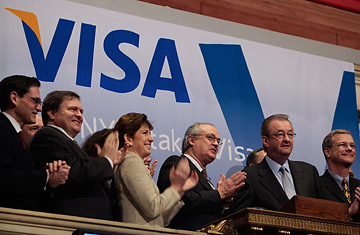
Top executives from Visa stand during opening bell ceremonies at the New York Stock Exchange in New York City, March 19, 2008.
It has been widely noted that the current dovetailing of the largest initial public offering in U.S. history and a panic-fueled recession seems counterintuitive. And many observers have correctly pointed out that Visa Inc. is largely immune from the downturn in consumer spending because it reaps its profits from fees charged on each transaction, as opposed to the total amount people spend. But several other underlying factors are driving this turbocharged IPO.
One key point is that more buyers are relying on plastic — for debit purchases. That's partly why transaction volume has remained strong even as spending declines; for the first time ever, in 2006, U.S. consumers made more debit purchases than credit charges. The funds may be pre-paid or come directly from checking accounts, but the debit cards are often Visa-branded. And because it's easier to obtain a debit card than a credit card, even people who have never qualified for a credit card before are enjoying the convenience of going cash-free.
Meanwhile, with home equity credit lines drying up, Americans have also become more reliant on their credit cards than ever. Overstretched consumers might be forced to bail on their mortgage — even if it means losing their home — but they'll continue to make the minimum payment on their credit cards, because that is their only safety net left. While default rates on subprime mortgages can be as high as 30%, the highest default rates being reported by card issuers is just 5%. Despite fears that the credit-card industry is poised to become the next subprime debacle, it is still highly profitable. "All the players are making money in the credit-card business," notes Moshe Orenbuch, a managing director at Credit Suisse. (Visa recently reported $434 million in quarterly profits versus $304 million for rival MasterCard.)
Perhaps the biggest reason that Visa's IPO price soared from $44 to $60 a share by noon on its first day of trading is simply that the company has massive growth potential, especially internationally. Visa Europe will remain a separate company for now, but "in the developing world, we are just scraping the surface," says Clifford Tan, an economist and visiting scholar at the Stanford Center For international Development. Visa's U.S. revenue grew a healthy 23% in fiscal year 2007, but its international revenue soared 57% over 2006. And as formerly cash-based economies in South Korea, China and India embrace the new electronic forms of payments — mobile phone–based transactions are garnering the most buzz — Visa's money-making opportunities are enormous.
It's an auspicious sign, too, that Visa's biggest competitor, MasterCard, which went public at $39 a share in 2006, is now trading at over $200 and has a market cap of more than $27 billion. That's about $10 billion above what Visa Inc. just raised with its IPO — and Visa is the market leader with 40% higher earnings than MasterCard. It doesn't take a math whiz to see why Wall Street is all charged up on the king of cards.
